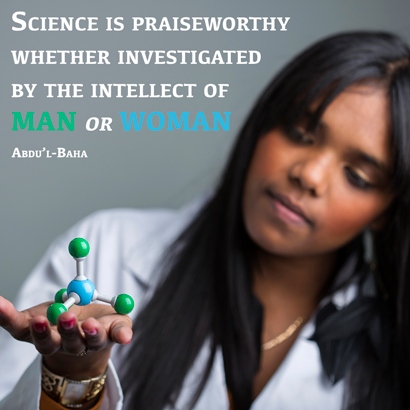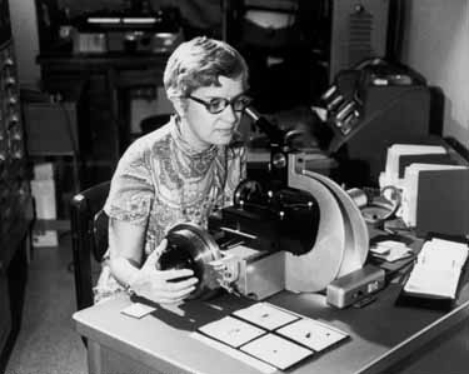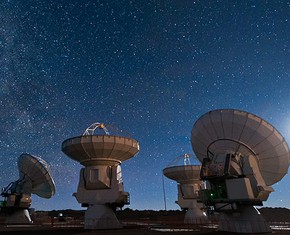The views expressed in our content reflect individual perspectives and do not represent the authoritative views of the Baha'i Faith.
Science is praiseworthy — whether investigated by the intellect of man or woman. – Abdu’l-Baha, The Promulgation of Universal Peace, p. 281.
 Have you ever heard of a scientist named Vera Cooper Rubin?
Have you ever heard of a scientist named Vera Cooper Rubin?
Probably not—but let’s see if we can rectify that.
Vera Rubin, one of America’s most brilliant and accomplished astronomers, originally did pioneering work on the rotation rates of galaxies. She realized, early in her career as an astronomer, that every star in spiral galaxies didn’t move through space the way the Newtonian laws of physics predicted they should. This led her and fellow Carnegie Institution researcher Kent Ford to the radical conclusion that most stars in spiral galaxies rotate at approximately the same speed. That discovery means one of two things—either Newton and every subsequent scientist was wrong about the gravitational constant; or even more strangely, galaxies contained huge amounts of mass that we couldn’t see, the so-called “dark matter” of the universe.

Vera Rubin
Scientists at the American Astronomical Society greeted Rubin and Ford’s discovery with tremendous skepticism. If true, it meant that many of the standard assumptions about the universe had to change. But their results, confirmed by many other scientists in the four decades since, have proven extremely accurate.
Right now you’re probably wondering—“What does this story have to do with spirituality or the Baha’i teachings?”
Here’s the incredible part of Vera Rubin’s largely unknown story: she graduated from Vassar in the early 1950’s, but couldn’t get admitted to Princeton because they wouldn’t allow women into their graduate astronomy programs until 1975. Instead, she went to Cornell, where she trained with the great physicist Richard Feynman. Her doctoral dissertation argued that galaxies rotate around their centers, rather than just simply moving outward from the Big Bang. She was right—but she was ignored. Despite her brilliance, the Palomar Observatory barred Dr. Rubin from using its telescope until 1965. The ostensible reason? The observatory had no women’s restroom. Can you imagine the scientific discoveries Dr. Rubin might have made if she hadn’t encountered that level of bias and discrimination against women?
Today, still motivated by her own personal determination to gain and maintain credibility as a female scientist, Dr. Rubin has made a point of encouraging young girls to pursue their dreams of becoming astronomers. She continues to fight for more women as members in the National Academy of Sciences.
So science, once seen as the exclusive purview of men, has gradually opened its doors to women, but much more needs to be done. The Baha’i teachings have always advocated equal education and equal opportunity for women:
The same education must be given to women as to men, so that they may acquire science and arts, so that they may advance along the course of civilization, in order that they may become proficient and attain to the level of men. – Abdu’l-Baha, Star of the West, Volume 2, p. 8.
This kind of educational and job-based bias against women in science has held back humanity’s progress, robbing us of the brainpower of half the population and the breakthroughs those potential scientists could have made. Thousands of examples of these still-existing prejudices could fill volumes, but these two, both of them very recent, tell the story succinctly:
When the New York Times published its 2013 obituary for the famous female rocket scientist Dr. Yvonne Brill, the first sentence read “She made a mean beef stroganoff, followed her husband from job to job and took eight years off from work to raise three children.”
Three years ago, in 2012, the prestigious journal Proceedings of the National Academy of Sciences reported on a study among science faculties at American universities. Faculty members reviewed a resumé from a hypothetical student, and then reported how likely they would be to hire or mentor that person, and what starting salary they would offer. They randomly received two possible resumés, the only difference being the name at the top—either John or Jennifer. Both male and female faculty members rated “John” as significantly more competent, more likely to be hired, and more likely to be mentored. The median starting salary they offered “John”? $3,000 over the starting salary offered to “Jennifer.”
Those are just a few of the reasons why the Baha’i teachings emphasize the education of girls and women so strongly. Abdu’l-Baha, in a speech he gave in Europe in the early 1900’s, put it this way:
In former times it was considered wiser that woman should not know how to read or write; she should occupy herself only with drudgery. She was very ignorant. Baha’u’llah declares the education of woman to be of more importance than that of man… The East has begun to educate its women. Some there are in Persia who have become liberated through this cause, whose cleverness and eloquence the ulama cannot refute. Many of them are poets. They are absolutely fearless…
I hope for a like degree of progress among the women of Europe — that each may shine like unto a lamp; that they may cry out the proclamation of the kingdom; that they may truly assist the men; nay, that they may be even superior to the men, versed in sciences and yet detached, so that the whole world may bear witness to the fact that men and women have absolutely the same rights. It would be a cause of great joy for me to see such women. – Abdu’l-Baha, Divine Philosophy, p. 86.
















Comments
Sign in or create an account
Continue with Googleor